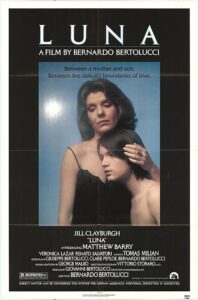|
Genres, Themes, Actors, and Directors:
- Alcoholism and Drug Addiction
- Alida Valli Films
- Bernardo Bertolucci Films
- Expatriates
- Incest and Incestuous Overtones
- Jill Clayburgh Films
- Singers
- Single Mothers
- Widows and Widowers
Review:
Bernardo Bertolucci’s infamous Oedipal tale about a self-absorbed opera diva and the incestuous love she exhibits towards her deeply troubled teenage son was panned by critics upon its release, with Vincent Canby of the New York Times referring to it as “one of the most sublimely foolish movies ever made by a director of Mr. Bertolucci’s acknowledged talents”, and Roger Ebert unabashedly proclaiming that “Bertolucci has sprung his gourd this time.” Nowadays, Luna is considered an undiscovered masterpiece by a handful of devoted followers — who refer to it on IMDb as a “superb film”, a “flawed masterpiece”, a “bizarre, surreal melodrama”, and “ultimate beauty in its purest form” — but I’m in agreement with the critical elite: despite its fine production values and cinematography (it’s undeniably beautiful to look at), Luna remains a laughable mess of a film, one which consistently defies literal interpretation and possesses far too much unintentional camp value to be taken seriously. While viewers are clearly meant to interpret the tale as archetypically Freudian — complete with a convenient “missing father figure” denouement — only those with an abiding belief in the veracity of psychoanalysis (such as Bertolucci himself at the time) will find any genuine nuggets of psychological insight here.
After the first promising 15 minutes or so (during which Fred Gwynne’s level-headed character is, unfortunately, killed off), nothing about the overblown storyline comes across as remotely realistic: Barry’s heroin addiction is never authentically introduced or sustained; peripheral characters disappear with maddening whimsicality (what ever happened to Barry’s new Italian girlfriend, for instance?); and Clayburgh’s response to her son’s problem — while refreshingly removed from “afternoon special of the week” banality — is far too conveniently sublimated into titillatingly incestuous interactions. Clayburgh (fresh from her success in Paul Mazursky’s An Unmarried Woman) seems to be trying her best with the material she’s been given, but her character is ultimately such a mess of unappealing contradictions that it can’t be salvaged; Barry, meanwhile, never fully inhabits his character’s neurotic personality — instead, he simply shifts at a moment’s notice between petulant teen and (supposed) raging addict. While viewers may find some enjoyment in the film’s overall campiness — such as the infamous scene in which Barry erotically licks his mother’s dirt-encrusted face, or when Clayburgh tries to release some tension by doing aerobics with her lesbian pursuer — Luna is ultimately far too frustrating to recommend.
Redeeming Qualities and Moments:
- Vittorio Storaro’s lush cinematography

Must See?
No; while it has a small following, and was somewhat notorious upon its release, it’s certainly not must-see viewing any longer.
Links:
|


One thought on “Luna (1979)”
Hey, one of your best posts!…for one of the all-time WORST films.
It’s almost staggering how unrelentingly awful this movie is – not even a devotee of mauvais cinema, such as myself, can defend it. If I could, for any reason whatsoever – i.e., camp value, I’d naturally bump it to ‘must’. But, whereas it potentially is the kind of train wreck that could lend itself to gales of laughter, ‘Luna’ has loftier ambition: it’s set on making you feel repeatedly cold-cocked; if you attempt to revive yourself at any time during the screening, it will once again knock you flat.
True, it starts off (kind of) well – briefly; during which poor Fred Gwynne becomes (in hindsight) lucky Fred Gwynne.
From that point, it’s about 132 minutes of cinematic miasma.
I can’t, unfortunately, even agree (as stated) that Clayburgh “seems to be trying her best”. Her performance reads to me as if she’s convinced that Bertolucci will do for her what ‘Last Tango in Paris’ did for Brando. (Which, now that I think about it, was, in a sense, what exactly?)
‘Luna’ appears to have made Peary’s cut because ‘Last Tango’ and ‘1900’ (even with its flaws) had, at the time, rendered Bertolucci the flavor of the day. Attention was apparently to be paid. Then ‘Luna’ was thrust upon us. I don’t think people knew what to make of it at first. Thankfully, now we do.
Bertolucci’s work is spotty. ‘The Conformist’ and ‘The Last Emperor’ stand above the rest. ‘Tango’ and ‘1900’ aren’t horrible, but they’re very problematic. Some less memorable stuff lies in the canon as well. But perhaps nothing less memorable than this – or, years later, the equally jaw-dropping ‘Little Buddha’.
Of course, as noted, DP Storaro’s work is astonishing. He captured all of the director’s major films. So you can turn the sound down on any of them at any time and be left with visual feasts.
All that said, I’ll keep my copy of ‘Luna’ in my library. Why? I know one day someone will ask, ‘Hey, have you got anything really unspeakably horrendous to watch?’ I will then bring out ‘the usual suspects’, adding ‘Of course, if you have 142 l-o-n-g minutes to (almost literally) kill, let me introduce you to…’